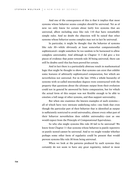And one of the consequences of this is that it implies that most systems whose behavior seems complex should be universal. Yet as of now we only know for certain about fairly few systems that are universal, albeit including ones like rule 110 that have remarkably simple rules. And no doubt the objection will be raised that other systems whose behavior seems complex may not in fact be universal.
In particular, it might be thought that the behavior of systems like rule 30—while obviously at least somewhat computationally sophisticated—might somehow be too random to be harnessed to allow complete universality. And although in Chapter 11 I did give a few pieces of evidence that point towards rule 30 being universal, there can still be doubts until this has been proved for certain.
And in fact there is a particularly abstruse result in mathematical logic that might be thought to show that systems can exist that exhibit some features of arbitrarily sophisticated computation, but which are nevertheless not universal. For in the late 1950s a whole hierarchy of systems with so-called intermediate degrees were constructed with the property that questions about the ultimate output from their evolution could not in general be answered by finite computation, but for which the actual form of this output was not flexible enough to be able to emulate a full range of other systems, and thus support universality.
But when one examines the known examples of such systems—all of which have very intricate underlying rules—one finds that even though the particular part of their behavior that is identified as output is sufficiently restricted to avoid universality, almost every other part of their behavior nevertheless does exhibit universality—just as one would expect from the Principle of Computational Equivalence.
So why else might systems like rule 30 fail to be universal? We know from Chapter 11 that systems whose behavior is purely repetitive or purely nested cannot be universal. And so we might wonder whether perhaps some other form of regularity could be present that would prevent systems like rule 30 from being universal.
When we look at the patterns produced by such systems they certainly do not seem to have any great regularity; indeed in most




